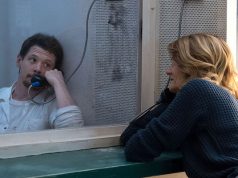“Monster’s Ball” is about very different strangers brought together by fate, though that time-worn plot device doesn’t begin to do justice to the complexity of this emotionally rich film.
In fact, none of what the film is “about” can adequately be explained just by describing it. It’s about racism, yes, and breaking off from poisonous family traditions, and the death penalty, and a thousand other things that have been dealt with already in other movies. But through Marc Forster’s slow, dreamily paced direction, Milo Addica and Will Rokos’ clear, simple script and — especially — Oscar-caliber acting from Billy Bob Thornton and Halle Berry, this film made of old parts seems as fresh and alive as if every one of its ideas were brand-new.
It is set in Georgia, a place with a long history of deeply felt racism. Hank Grotowski (Thornton) has inherited this from his now-decrepit father (Peter Boyle), but the hate seems to be watered down with each generation: Hank only seems to mirror his father’s attitudes, enacting them out of habit more than out of genuine belief in them, and Hank’s grown son (Heath Ledger) hasn’t got any of it at all.
Sonny, as he is called, is a disappointment in other ways, too. Old Buck and Hank both were correction officers, and Sonny — as profoundly unhappy as any film character you’ll see — has tried to carry on the rugged family tradition. But he is not cut out for such brutal work as overseeing executions, and Buck and Hank consider him weak.
Among those to be executed under Hank’s watch is Lawrence Musgrove (Sean Combs), the husband of Letitia (Berry), who has lost any love she ever had for her murderous spouse. She barely notes his death, though the film does not flinch for a moment in depicting his visit to the electric chair.
Circumstances cause Letitia to be acquainted with Hank — the man who flipped the switch on her husband — and an unlikely bond develops between them. They have in common a great deal of familial pain, not to mention violent tempers. “Monster’s Ball” becomes the story of how two such coarse, flawed people can refine one another into something workable.
This is by and large a quiet movie, with very little musical underscoring and not a bit of flashiness. Forster is confident enough in his script and actors, as well he should be, and is content to let them shine.
The inevitable discovery by Letitia that her new boyfriend was her husband’s executioner is dealt with so admirably, I wanted to stand up and applaud. When I think of the melodrama that could have resulted, and ponder how this film turned it into something beautiful and life-affirming instead, it makes me hopeful about the intelligence and depth motion pictures can convey. It doesn’t need to be cheap and easy to win an audience; moviegoers like it when movies assume a certain level of maturity in them.
Much has been made of Thornton’s and Berry’s performances, and with good reason. Thornton’s Hank is a closed-off man, reminiscent of his work in “The Man Who Wasn’t There,” in which he also played a working-class guy with no access to his own emotions. Berry plays Letitia with marvelous insight and realism, giving the impression we are watching not an actress but a real person.
A- (; )





